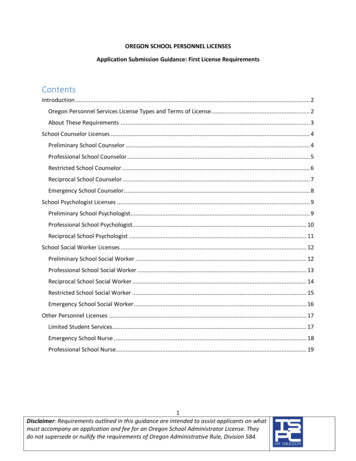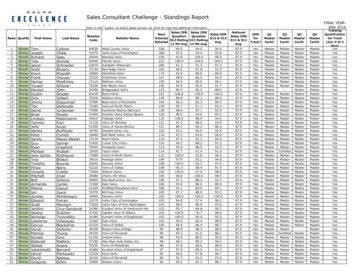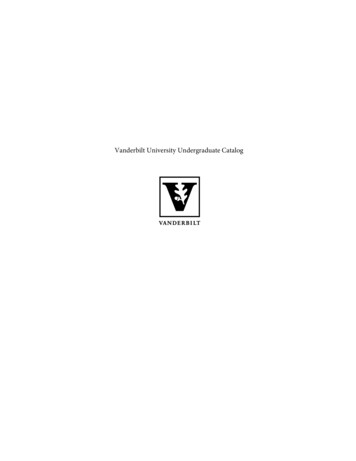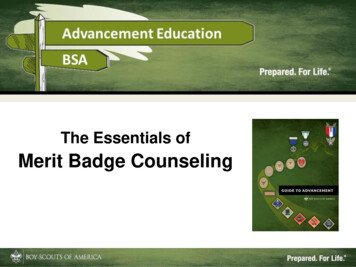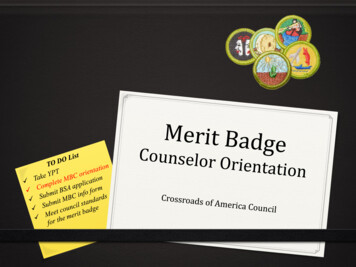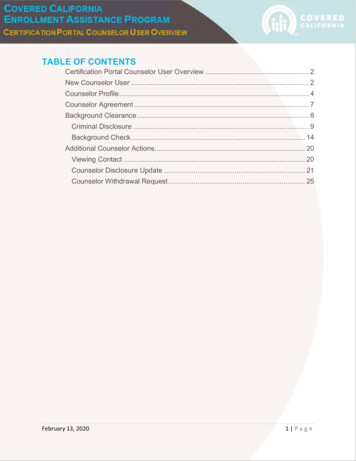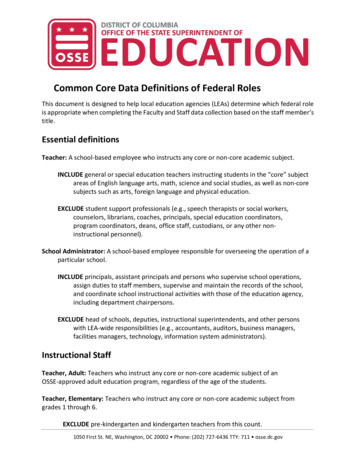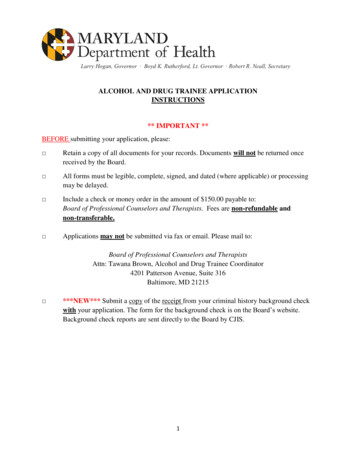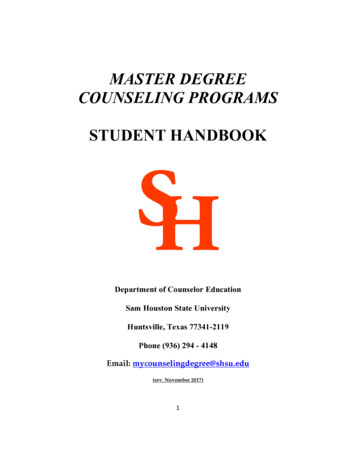
Transcription
MASTER DEGREECOUNSELING PROGRAMSSTUDENT HANDBOOKDepartment of Counselor EducationSam Houston State UniversityHuntsville, Texas 77341-2119Phone (936) 294 - 4148Email: mycounselingdegree@shsu.edu(rev. November 2017)1
TABLE OF CONTENTSIntroduction . . 5Letter to Students . 6Professional Identity . 7Philosophy . . . 8About Your Licensure and Certification Options . . 9Clinical Mental Health Counseling (LPC Intern) . 9Marriage, Couple, and Family Counseling (LMFT Associate) .9School Counseling 10Professional Associations 11Pre-requisites for Program Admission . 12Proposal to Transfer Credits . 14Course Prerequisites . 15Degree Requirements.16M.Ed. in School Counselor and Certification . . .16M. A. in Counseling (CMHC specialization) . . 17M. A. in Counseling (MCFC specialization). . 18Examples of the Sequence of Courses 19School Counselor Track for Full and Part-Time Students .19CMHC Track for Full and Part-Time Students . . 20Marriage, Couple, and Family Counseling Coursework . . 21Course Advisement for Master’s In Counseling Programs. .22Counseling Program Faculty and Staff . 23Campus Services 252
BearKat One Card. . 25Academic Library . 25Writing Center . 25University Counseling Center and Student Health Center. 26Career Services. 26Computer Labs. 26Initial Academic Procedures . . 27Initial Entry into the Program.27Possible Types of Admission to Graduate Studies.27Prior to Registration . . .28Candidacy for the Master’s Degree . . .29Upon Completion of First 18 Semester Hours of Coursework.29Procedures for Filing for Candidacy.29Professional Review of Counseling Students . .31Semester Before Enrolling in COUN 6376 Supervised Practice . .31Semester Before Enrolling in COUN 6386 Internship .31During the Semester of.should take the Comprehensive Examination .32Procedures for Recommending Students for Credentialing/Employment . 33Remediation Protocol for Master’s Candidacy Applicants . 33Exclusion of Students . 36Grievance Policy 36Practicum /Clinical Information Philosophy .Practicum Curriculum Practicum Requirements .39393939COUN 5385 Pre-Practicum: Techniques of Counseling . 41COUN 6374 Practicum in Group Counseling . 41COUN 6376 Supervised Practice in Counseling . 41Supervision . 423
Services 42Client Case Assignments and Procedures . 43Procedures for Scheduling or Obtaining Counseling 43Procedures for Counseling Sessions . 43Care and Maintenance of Clinical Records 43Audio- and Video-recording .44Student Liability Insurance . 44Referral Services and Relationship with Other Agencies . 44Code of Ethics / Confidentiality . 45COUN 6386 Internship (two semesters required) . 47Pre-Class Procedures . 47Course Requirements . 47Appendices . 48Appendix A: Temporary Study Plans . . 49Clinical Mental Health Counseling 49School Counseling 50Marriage, Couple, and Family Counseling 51Appendix B: Counselor Potential Scale . . 52Appendix C: Pre-Practicum Proficiencies . 53Appendix D: Supervised Practice in Counseling Proficiencies 54Appendix E: CACREP MCFC Assessment Key Performance Indicators 56Appendix F: CACREP MCFC KPIs Assessments Rubric 61Appendix G: Writing Standards 644
IntroductionThe Department of Counselor Education at Sam Houston State University offers a Masterof Education Degree in School Counseling (SC), a Master of Arts Degree in Counseling (with twoseparate specializations; one in Clinical Mental Health Counseling (CMHC) and one in Marriage,Couple, and Family Counseling (MCFC), and a Doctor of Philosophy Degree in CounselorEducation. Only one program is not CACREP accredited and that is the specialization in Marriage,Couple, and Family Counseling. However, we are moving that program toward CACREPaccreditation and are currently engaged in the required self-study to that end. CACREP is theCouncil for Accreditation of Counseling and Related Educational Programs (CACREP). Twocounseling clinics, Jack Staggs Counseling Clinic (JSCC) at SHSU campus in Huntsville and theCommunity Counseling Clinic (CCC) at SHSU-The Woodlands Center are affiliated with theDepartment of Counselor Education. During the semester when students in the master’s anddoctoral programs are enrolled in supervised practicum in counseling courses, they see clients inthe JSCC or the CCC. The clinics operate with the dual purposes of clinical training andcommunity service. The Department of Counselor Education is accountable through theDepartment Chairperson to the Dean of the College of Education and the Academic Vice-Presidentof the University.This Handbook outlines the two Master Degrees and presents a description of relatedpolicies and procedures established by the Department of Counselor Education. The Handbooklink is resources-for-current-students.html.Students are responsible for following these policies and procedures, in addition to those statedin the Graduate Catalog of the University. The Graduate Catalog is available at:http://catalog.shsu.edu/graduate/.Please read this Handbook thoroughly. During the first class meeting of COUN 5011,Orientation to the Counseling Profession (for SC and CMHC) or COUN 6334 Ethical Issues inMFT (for MCFC), students will be asked to initial a statement on the Temporary Study Planindicating they have read the Handbook. In addition, students will be asked to initial a statementon the Temporary Study Plan indicating they have read the American Counseling Association(ACA) Code of Ethics available online at:5
Dear Students:Welcome to the Department of Counselor Education at Sam Houston State University!This is an exciting time to be part of our program. The M.Ed. and M.A. programs in Counselingare highly regarded in this region. The counseling faculty are constantly working to improve theprograms to make certain we provide quality training and learning opportunities for you.The purpose of this Handbook is to inform you about the many details involved in going throughthe Master's programs and to explain to you about the facilitation of our clinical component, theSupervised Counseling Practicum. We have also included information about the Cycle of Courses,a step-by-step guide for "getting through the academic system,” as well as details about theSupervised Practicum in Counseling, Internship, and the comprehensive examination.Because growth is ongoing, changes in policies and procedures may occur throughout thesemester. The Handbook will be updated with the new information as quickly as possible. Writtenannouncements of changes will be circulated in face-to-face classes and by Listserv for studentsenrolled in online courses. Everyone (students, staff, faculty, and administration) is accountablefor implementing the change as soon as the change has been announced.Please become very familiar with those details in the Handbook, which will affect you and youracademic career. Feel free to ask faculty or staff members about anything you do not understand.It is our goal to support and assist you in any way possible as you undertake this adventure inprofessional and personal growth.Sincerely,Dr. Jeffery SullivanCounseling Program Coordinator6
PROFESSIONAL IDENTITYA comprehensive mission statement has been developed, with input from core faculty, whichbrings the Counseling Program into focus and concisely describes the intent and purpose of theprogram. The mission statement is publicly available (i.e., department website and studenthandbook) and systematically reviewed to affirm that the mission of the program is aligned withthe mission and goals of Sam Houston State University. Faculty reviewed the mission statementin 2006 prior to the Clinical Mental Health Counseling Program being implemented and it wasreviewed again in 2013 with minor modifications. The most recent review resulted in a minorphrase addition of “at the master’s level.” This modification was to better distinguish the differencein focus between the mission statement for the doctoral program and masters. The web address forviewing our mission statement is: aboutus.html.Counseling Program Mission StatementThe mission statement of the SHSU Counseling Program is to facilitate the development ofprofessional counseling generalists at the master’s level who play an active role in enhancingindividual, family, and community wellness in a diverse and changing world.Program Area GoalsWithin the context of this mission, the goals of the Counseling Program are to:v Provide assistance to qualified students in learning the knowledge and skills necessary toperform as competent and knowledgeable professionals in the counseling field. Thisincludes encouraging students to develop themselves as well-rounded individualscombining their academic experience, personal values, interests, and individualpersonalities.v Provide academic coursework and clinical experience that support and enhance theprofessional development of the student that holds to the integrity of CACREP standards.v Facilitate the Supervised Practicum in Counseling in both the Jack Staggs CounselingClinic and Community Counseling Clinic at SHSU-The Woodlands Center, primarily forclinical training, where advanced graduate students have opportunities for direct clientcontact and individual and group supervision from counseling faculty and counseloreducation doctoral students. Because of the availability of practicum interns, the7
Supervised Practicum in Counseling also provides assessment and counseling for thegeneral public in both the greater Huntsville and Woodlands regions.v Promote understanding and acceptance of the cultural diversity of our society.v Model the standards of integrity, performance, and concern for clients’ welfare.The goals of the Counseling Program were most recently reviewed in 2013. Goals were developedwith consideration of input from a) the Master’s Advisory Board, b) former program graduates asa part of the Master’s Advisory Board, and c) core faculty.Counseling faculty review the goals to ensure they meet the following requirements:1.2.3.4.Reflect the current knowledge and projected needs of a multicultural and pluralistic society.Reflect input from faculty, current and former students, and cooperating agencies.Relate to program activities.Are written in a way that student training can be evaluated.PHILOSOPHYThe Counseling Program is based on the belief that the ultimate goal of counseling is maximizinghuman effectiveness through facilitating human growth and development. The majorresponsibility of the counselor is seen as one of aiding individuals, couples, and families in theacquisition of effective problem-solving and decision-making patterns that help to establish valuesand life objectives.The process of promoting effective decision-making behavior in others requires a firm belief inthe potential for growth within each individual. In addition, counselors need to have a soundbackground in the psychology of human behavior and development, and the necessary skills andtechniques to support clients to make desired changes.8
ABOUT YOUR LICENSURE AND CERTIFICATION OPTIONSClinical Mental Health Counseling/Licensed Professional Counselor (LPCIntern)-CACREP ACCREDITED PROGRAM (M.A. in Counseling degree)Students completing the 60-semester hour Clinical Mental Health Counseling (CMHC)specialization meet the academic requirements needed to apply for LPC Intern in the State ofTexas. To apply for the LPC Intern license, graduates must document coursework, face-to-facecounseling hours, and supervision time on forms available from the Texas State Board ofExaminers for Licensed Professional Counselors http://www.dshs.state.tx.us/counselor/. This stateagency issues credentials for individuals who want to be recognized as having competence in thefield of counseling. Texas State Board of Examiners for Licensed Professional Counselors issueLPC Intern credentials to counselors in training that successfully complete required coursework,supervised counseling experience, pass the appropriate state examinations, and meet additionalrequirements.Upon completion of SHSU coursework, each graduate is responsible for taking steps necessary toapply for the LPC Intern license. She/he will need to complete a 3000-hour (total work time) postmaster's degree internship under an LPC-Supervisor. Although providing the academicrequirements for licensure is the responsibility of SHSU, the university has no responsibility forhelping the graduate meet the LPC Intern supervised experience requirements followinggraduation. Each graduate is encouraged to do extra study for the LPC exam. Some graduatesfind a workshop designed to prepare applicants for the LPC examination useful. More informationabout the LPC can be found at the Internet website for LPC athttp://www.dshs.state.tx.us/counselor.SHSU is a testing site for the National Counseling Examination (NCE). The National Board ofCertified Counselor (NBCC) website address is http://www.nbcc.org/. Students seeking moreinformation about the NCE need to contact Dr. Henriksen at rch008@shsu.edu.Marriage, Couple, and Family Counseling specialization/LMFT Associate (M.A. inCounseling)Students completing the 60 semester hour Marriage, Couple, and Family Counseling (MCFC)specialization meet the academic requirements needed to apply for LMFT Associate. Studentswishing to also qualify for LPC Intern in the State of Texas must take an additional 6 semesterhours (ethics and a combined diagnosis/psychopharmacology). The MCFC courses will meet theacademic requirements needed to apply for a License for a Marriage and Family TherapistAssociate (LMFT Associate) in the State of Texas. Upon completion of SHSU coursework andgraduation from SHSU, graduates are responsible for taking steps necessary to apply for theLMFT Associate, where the student will need to complete 3,000 hours of which 1,500 hoursmust be direct clinical services including, 750 direct contact hours with couples and family andweekly supervision from an LMFT-Supervisor. Although providing the academic requirementsfor licensure is the responsibility of SHSU, the University has no responsibility for helping the9
graduate meet the LMFT Associate experience requirements following graduation.The Texas State Board of Examiners of Marriage and Family Therapists website address ishttp://www.dshs.state.tx.us/mft/. Students seeking more information about LMFT in Texas andthe requirements for adding this focus of study need to schedule an appointment with Dr. SusanHenderson, faculty advisor for marriage and family therapy coursework. To apply for the LPCIntern, graduates must document coursework, face-to-face counseling hours, and supervisiontime on forms available from the Texas State Board of Examiners for Licensed ProfessionalCounselors http://www.dshs.state.tx.us/counselor/ .School Counseling Certification (M.Ed. Degree)Applicants interested in becoming certified as professional school counselors should meet thefollowing requirements prior to admittance into our program or sign a statement acknowledgingthey are aware that the State Board of Education Certification (SBEC) requires school counselorapplicants to have: Two years of teaching experience A master’s degree, and A passing score on the TExES examination for school counselors.The two years of teaching experience is not required prior to enrolling in the Master of Educationprogram at SHSU; however, it is required before SBEC will issue the school counselingcertification to applicants. Individuals needing the master degree should apply for the M.Ed.degree in School Counseling.Individuals needing two years of teaching experience should seek employment with a schooldistrict as a teacher. If the applicant is not certified to teach, she/he should contact the DepartmentChair for Curriculum and Instruction to obtain coursework necessary for teacher certification.The school district must send the deficiency plan request to the College of Education UniversityCertification Officer in the Teacher Education Center Box 2119, Huntsville, TX 77341. TheCertification Officer will, upon receiving the written request from the student’s school district,consult with the Coordinator of the Counseling master’s degree to determine the appropriatecoursework to be completed and provide information on the State TExES examination requiredfor certification.School Counseling CertificationAfter passing the written comprehensive examination, students in the School Counseling track willbe reported to SHSU Certification Office as approved to register for the TExES School CounselingExamination (#152). To apply to take the TExES, students register with the State Board ofEducator Certification (SBEC) athttps://tea.texas.gov/Texas Educators/Preparation and Continuing Education/Educator Preparation Home/ . Students must have a TEA identification number in order to register for the TExES.10
Test dates and registration details for the TExES examination are located at: http://texes.ets.org.NOTE: The State Board of Educator Certification (SBEC) has discontinued the practice of issuingspecialized certificates for special education counselor and vocational counselor. All schoolcounselors are now certified under the general Professional Counselor Certificate.PROFESSIONAL ASSOCIATIONSThe following are the various professional association counseling students need to be aware of tofurther their career as an LPC, LMFT, or SC: American Counseling Association (ACA), the TexasCounseling Association (TCA), the International Association of Play Therapy, InternationalAssociation of Marriage and Family Counselors, Texas Association of Marriage and FamilyCounselors, Texas Association for Marriage and Family Therapy, and the American Associationof Marriage and Family Therapy (AAMFT), along with many other specialty counselingassociations. Students are encouraged to become members of the many different organizations andto attend their conferences as both attendees and presenters. Students are encouraged to considerusing the liability insurance afforded them by membership in the ACA, TCA, or AAMFT.The counseling program at Sam Houston State University also maintains a chapter of Chi SigmaIota, the counseling academic and professional honor society international. Through thisorganization students are able to further learn about leadership in the counseling profession.11
PRE-REQUISITES FOR PROGRAM ADMISSIONA committee made up of full-time counseling faculty will make admissions decisions based upona holistic review of all of the following elements:1. An application for graduate studies completed at ApplyTexas and submitted to theDepartment of Graduate Studies. Access ApplyTexas application athttps://www.applytexas.org/adappc/gen/c start.WBX.2. Official transcripts of all college/university coursework, sent directly from the respectiveregistrars of the institution(s) to Graduate Studies.3. A grade point average of 3.0 overall (undergraduate) or 3.0 for the last 60 semester hours ofundergraduate coursework is required. Some exceptions are made based on strengths in othercomponents of the application.4. Scores from either the Graduate Record Exam (GRE) general test no older than five years mustbe submitted to Graduate Studies.5. Three confidential reference evaluation forms completed from individuals who can validate anapplicant’s potential for graduate study in counseling, as well as appropriateness for thecounseling profession.Copies of the reference forms are available online ents.htmlOne reference must be from a current or former employer/supervisor. One must be from aformer professor; a Certified School Counselor or a Licensed Counselor, Licensed Marriageand Family Therapist, LCSW, or Psychologist. A third must be from someone other than afamily member. References must be mailed directly to the program from the individualcompleting the reference form. Applicants should give each person submitting a reference astamped envelope addressed to: Department of Counselor Education, Counseling ProgramSecretary; P.O. Box 2119, Sam Houston State University, Huntsville, TX 77341-2119.6. Three semester hours of undergraduate coursework in Abnormal Psychology with a grade of“C” or better is required prerequisite course. Applicants who have not completed thisprerequisite course may complete this requirement under a Conditional Admission status forone semester.7. Satisfactory response to the following essay questions in no more than two typewritten, doublespaced pages total:a. What is your experience related to the counseling field, either paid or volunteer?b. What are your aspirations related to the field of counseling?12
c. Describe one or more significant life event(s) that contributed to the development of theseaspirations.d. What is the one personal characteristic or quality that you most need to modify, improveor change in order to realize your aspirations?8. A pre-admission on-campus-screening interview. Applicants should contact the CounselingProgram Secretary at (936) 294-4148 to make an appointment for a pre-admission on-campusscreening interview. During the interview, applicants will respond to a set of structuredquestions. Each interview will be recorded. After the interview is completed, a summary ofthe interview and the recording of the interview will be forwarded to the Counseling ProgramAdmissions Committee for final disposition. Applicants are encouraged to complete theinterview by July 30 for fall admission, November 30 for spring admission and April 30 forsummer admission.The following essay question will be written immediately following the interview:“First, describe what you believe constitutes a helping relationship. Next, describe amoment when your personal motivations, values, or beliefs interfered with your ability tohelp someone. Knowing what you know now, what, if anything, would you have donedifferently and how might that have changed the outcome?”Three letters of recommendation, responses to the essay questions and requests for furtherinformation must be directed to: Department of Counselor Education, Counseling ProgramSecretary, Sam Houston State University, Huntsville, Texas 77341-2119.Application information and forms for the Master of Education are available at:http://www.shsu.edu/ grs www/Counseling M.Ed.htmland for the Master of Arts at:http://www.shsu.edu/ grs www/Counseling M.A.html.13
Proposal to Transfer CreditIn accordance with Academic Policy Statement 801007, graduate courses completed at otheraccredited colleges and universities may be applied as transfer credit toward the Master ofEducation and the Master of Art degrees. The maximum credit hours that may be transferredaccording to the policy are: 12 hours for a 48-hour degree and 15 hours for a 60-hour degree. Onlydidactic courses will be considered for transfer credits. Practicum courses will not be consideredfor transfer credits and all practicum courses, even those students have completed at anotheruniversity, must be taken at SHSU. Once a student has been accepted into the program,consideration will be given to graduate work done at other accredited institutions in courses thatwere clearly at the graduate level with grade B or better, and appropriate to Counseling Programcourse requirements. In addition, all coursework, including the transferred credits, must becompleted within six years from the earliest date of the first course applied to the master degree.Every request for transfer of credits is reviewed individually and the faculty advisor must make arecommendation on the student's behalf to the Dean of Graduate Studies.When there is a question about accepting credit for didactic courses taken at other institutions,students must provide the course syllabus and/or catalog description of the course to documentsubstantial equivalence to SHSU courses.14
COURSE PREREQUISITESOnce students have been accepted into the program, they should note the prerequisites for specificcourses in the program.COURSECOUN 5088COUN 5334COUN 5370COUN 5385COUN 5391COUN 5398COUN 5399COUN 6331COUN 6333COUN 6335COUN 6337COUN 6338COUN 6364COUN 6370COUN 6374COUN 6376COUN 6386 ICOUN 6386 IIPREREQUISITE(S)Permission of instructorCOUN 5397 and undergraduate course in AbnormalPsychologyCOUN 5397COUN 5364 and COUN 5011 (or concurrently)COUN 5334COUN 5364 and COUN 5385COUN 5364 and COUN 5385COUN 5399COUN 6332COUN 5333COUN 5334 and COUN 6332COUN 6332COUN 5334COUN 6332 & concurrently enrolled in 6376 or 6386COUN 5385 and COUN 5364COUN 5334, COUN 6374 (or concurrently enrolled in 6374),COUN 6363 and Admission to Candidacy. (For CMHC,COUN 5391)COUN 6376COUN 6386 IA copy of the Master of Education and Master of Arts Temporary Study Plans areavailable in Appendix A.15
DEGREE REQUIREMENTSM.Ed. in School CounselingForty-eight semester hours are required for the Master of Education in School Counseling.Courses are organized in blocks that should be completed in sequence. All students mustpass the written comprehensive examination (CPCE) including subject matter from allCACREP core content areas.Block 1COUN 5011COUN 5364COUN 5392COUN 5385COUN 5397COUN 5333Orientation to the Counseling ProfessionTheories of CounselingCross-Cultural Issues in CounselingPre-Practicum: Techniques of CounselingHuman Growth and DevelopmentMethods of Consultation, Coordination, and CounselingBlock 2COUN 5379COUN 5334COUN 6374COUN 6363Methods of ResearchEffective Human BehaviorPracticum in Group CounselingAssessment in Guidance and CounselingBlock 3COUN 6335COUN 5391 /or 5399COUN 6376COUN 5370Block 4COUN 6386COUN 6386School Counseling: Leadership, Advocacy, andAccountabilityChild and Adolescent Counseling /or Play Therapy BasicsSupervised Practice in CounselingCareer Counseling Across the LifespanInternshipInternship II16
M. A. in Counseling (Clinical Mental Health Counseling)Sixty semester hours are required for the Master of Arts in Counseling (Clinical MentalHealth Counseling track). Courses are organized in blocks that should be completed insequence. All students seeking the M.A. degree must pass the written comprehensiveexamination (CPCE) including subject matter from all CACREP core content areas.Block 1COUN 5011COUN 5364COUN 5379COUN 5385COUN 5392COUN 5397Orientation to the Counseling ProfessionTheories of CounselingMethods of ResearchPre-Practicum: Techniques of CounselingCross-Cultural Issues in CounselingHuman Growth and DevelopmentBlock 2COUN 5334COUN 6374COUN 5370COUN 6363Effective Human BehaviorPracticum in Group CounselingCareer Counseling Across the LifespanAssessment in Guidance and CounselingBlock 3Second Ethics course (course being created)Diagnosis/Pharmacology (course being created)Elective (see options below)Block 4COUN 5393COUN 6364COUN 6332COUN 6376Community CounselingCounseling for AddictionsTheories of Marriage and Family TherapySupervised Practice in CounselingBlock 5COUN 6386COUN 6386InternshipInternship IIElective Options:COUN 5391COUN 5398COUN 5399COUN 6331COUN 6337COUN 6333COUN 6338Child and Adolescent Issues in CounselingSandtray TherapyPlay Therapy BasicsAdvanced Play TherapyCounseling Clients for Sexual ConcernsTechniques of Couples TherapyTechniques of Family Therapy17
M. A. in Counseling (Marriage, Couples, and Family Counseling)Sixty semester hours are required for the Master of Arts degree. Courses are organized inblocks that should be completed in sequence. All students seeking the M.A. degree mustpass the written comprehensive examination (CPCE) including subject matter from allCACREP core content areas. Key Performance Indicators for MCFC will be assessed atthree points during the program.Block 1COUN 6334COUN 6332COUN 5385COUN 5397COUN 5392COUN 5379Ethical Issues in MFTTheories of Marriage and Family TherapyPre-Practicum: Techniques of CounselingHuman Growth and DevelopmentCross-Cultural Issues in CounselingMethods of ResearchBlock 2COUN 6363COUN 5364COUN 5370COUN 6374Assessment in Guidance and CounselingTheories of CounselingCareer Counseling Across the LifespanPracticum in Group CounselingBlock 3COUN 5334COUN 6337COUN 5394COUN 6338COUN 6333Effective Human BehaviorCounseling Clients for Sexual ConcernsCrisis and Trauma in CounselingTechniques of Family TherapyTechniques of Couples TherapyBlock 4COUN 6364COUN 6370COUN 6376Block 5COUN 6386COUN 6386Counseling for AddictionsFamily Therapy ApplicationsSupervised Practice in CounselingIntern
Clinical Mental Health Counseling/Licensed Professional Counselor (LPC Intern)-CACREP ACCREDITED PROGRAM (M.A. in Counseling degree) Students completing the 60-semester hour Clinical Mental Health Counseling (CMHC) specialization meet the academic requirements needed to apply for LPC Intern in the State of Texas.
